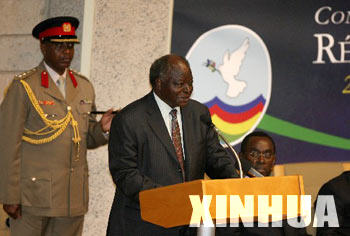| Tools: Save | Print | E-mail | Most Read |
| African Leaders Resolve to Curb Military Flare-ups in Great Lakes Region |
| Adjust font size: |
Kenyan President Mwai Kibaki (front) addresses at the end of the second International Conference on the Great Lakes region in The second The 11 countries in the Speaking at the closing of the two-day summit in "I note with particular appreciation that the protocol on non aggression and mutual defense will lay a foundation that will serve to prevent conflict. I call upon all leaders of the He said the summit had opened a new chapter for the future of the region, noting member states have committed to anchor their bilateral relations on respect for the principles of national sovereignty, territorial integrity and noninterference in the international affairs of other member states. According to the documents, the region would require 1.25billion U.S. dollars for economic development and regional integration and 467 million dollars will be for internally displaced people and social services programs. The leaders also proposed that 225 million dollars be used for security with 23 million dollars for democracy and good governance programs. "Special emphasis will be placed on the thorny issue of armed groups. Our reciprocal confidence will end the problem once and for all. We will not spare any action to implement the pact," said President Joseph Kabila of the Democratic Republic of Congo (DRC), who just won presidency in a historic election. "The signing today of the pact constitutes a crowning of a laborious negotiation process that opens for people the prospects of democracy, good governance and economic development," Kabila added. The pact also calls on member states "to criminalize any act of aggression or subversion against other states by individuals or groups operating in their respective states." The pact which is a culmination of more than four years of regional negotiations among member states, also contains a package of measures which promises to enhance the lives of the forcibly displaced, including a regional protocol on protection and assistance for internally displaced, which will be the first legally binding regional instrument specifically dealing with IDPs anywhere in the world. The Great Lakes region initially included countries that share the lakes of The region has one of the most ecologically diverse freshwater systems in the world and boasts of the intensely-dispersed mineral resources, including copper, gold, cobalt, diamond, oil, natural gas and wood, but it is also regarded as one of the most volatile areas in the world with long-running conflicts between ethnic groups and between governments and rebel troops. (Xinhua News Agency December 16, 2006)
|
| Tools: Save | Print | E-mail | Most Read |
 |
| Related Stories |
|
Product Directory China Search |
Country Search Hot Buys |
